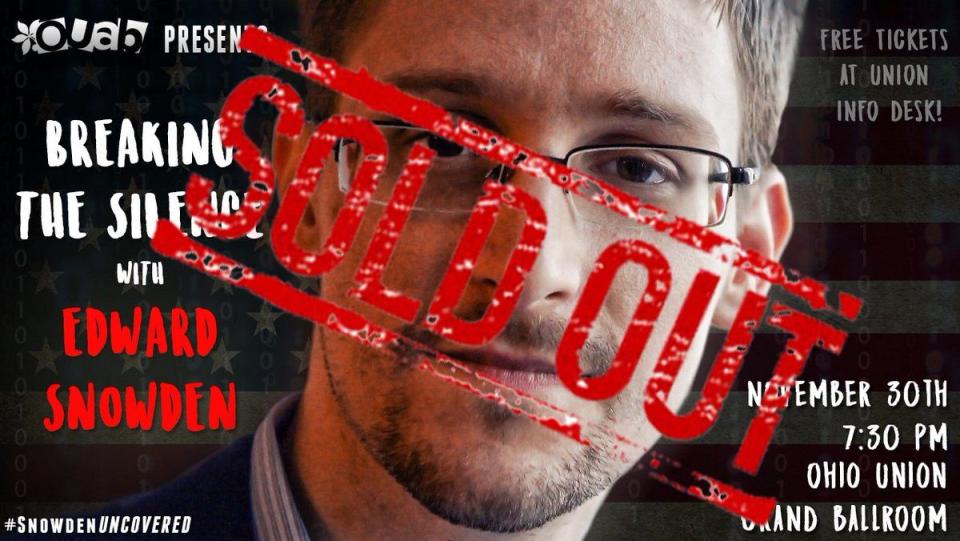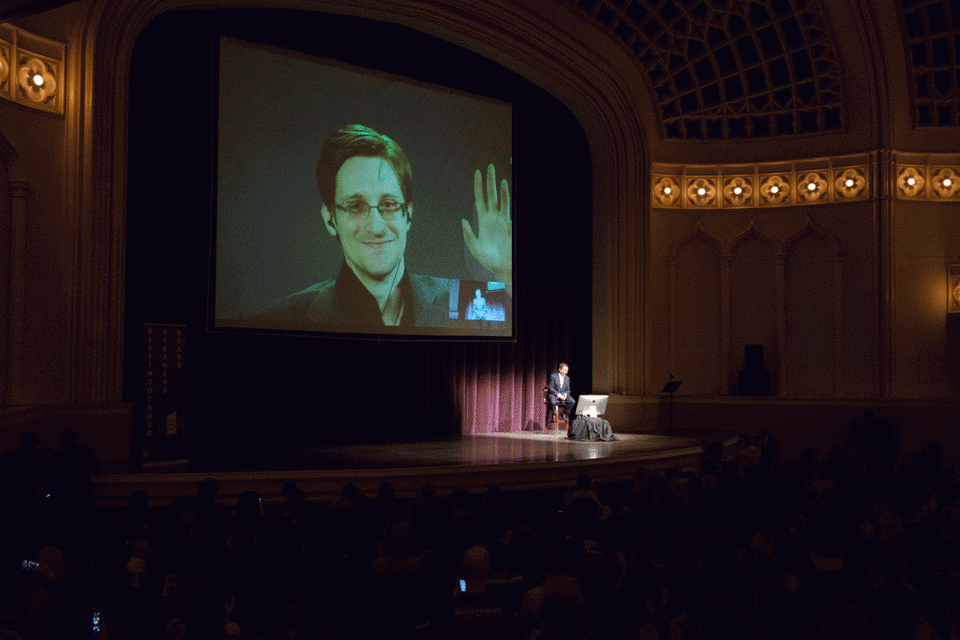As tensions rise with Russia, U.S. colleges still pay for Snowden speeches

Last November, former NSA contractor Edward Snowden was beamed in from somewhere in Russia to address a crowd of Ohio State University students.
“Democracy only works for all of us when we all work to uphold the system,” Snowden, appearing on a giant video screen, told the sold-out crowd of about 1,700. “The letters of the constitution are not going to jump off the page and protect your rights. People give those letters strength.”
The university paid $30,000 through an American speakers’ bureau to digitally host Snowden, one of his largest known contracts to date, according to documents obtained by Yahoo Finance. The Ohio State event was one of a series of speeches that have netted Snowden — who is still a fugitive in the eyes of the U.S. government — well over $200,000 in the past two years, as Yahoo News first reported last year. He has continued to give paid speeches, including at U.S. colleges, in 2017.
The ongoing speaking contracts come at a time when Snowden’s fate and influence are more uncertain than ever. A campaign by Snowden’s supporters to win him a pardon was rebuffed by the outgoing Obama White House, and new President Donald Trump previously labeled him a “terrible traitor.”
Moreover, Snowden’s efforts to present himself as an Internet privacy pioneer are now complicated by an American political environment colored by increasing wariness and hostility toward Snowden’s host since June 2013: Russian President Vladimir Putin.

‘It definitely looks bad’
In January, U.S. intelligence agencies publicly asserted that the Kremlin executed an elaborate influence campaign aimed at hurting the candidacy of Putin foe Hillary Clinton and boosting the candidacy of Putin admirer Donald Trump. (U.S. agencies are also investigating contacts between Trump campaign aides and Russian officials.)
“There is no question that there has been a dramatic shift in the surveillance debate in the U.S. since the Russian hacking of the 2016 presidential election,” Marc Rotenberg, president of the Electronic Privacy Information Center (EPIC) and adjunct professor of law at Georgetown University, told Yahoo Finance in an email.
EPIC is currently attempting to compel the office of the director of national intelligence to release its complete assessment on Russia’s election interference. Rotenberg noted that the debate ignited by Snowden’s advocacy has given way to considerations of Russian meddling.
“Snowden raised important questions about the scope of U.S. government surveillance,” Rotenberg said. “And his efforts led to reforms, including passage of the Freedom Act. And he continues to make good arguments for legal control of surveillance authority. But now the focus is on understanding and preventing cyberattacks on democratic institutions. Without democratic institutions, it is not possible to enforce the rule of law.”

Snowden’s speaking events highlight his peculiar situation as a 33-year-old former U.S. intelligence contractor being paid hundreds of thousands of dollars from speaking contracts — some from public American colleges — while living under guard at an undisclosed location in the territory of a resurgent adversary.
“It definitely looks bad that he’s over there in Russia,” Chris Weber, a cybersecurity expert who co-authored the 2002 book Privacy Defended and supports more transparency about government surveillance, told Yahoo Finance. “It could be damaging to privacy advocates and to all of the progress that has been made since his original revelations, because he is still in Russia and there’s a lot of tension.”
Weber, who has been writing about U.S. government surveillance since before the 2001 passage of the Patriot Act, which expanded the government’s authority to conduct the kind of surveillance Snowden exposed, noted that it’s reasonable to wonder whether Snowden could be manipulated as part of a larger game.
“He turned the lens around for a brief period so that we could look in the mirror,” Weber said. “Now that lens has been turned back around,” Weber added, noting that Snowden’s mysterious living situation “kind of invalidates things for a lot of people.”
‘Foreign interference is a common thing’
Snowden, for his part, has given mixed messages about his view of political tensions between Moscow and Washington.
He has sometimes been publicly critical of the Kremlin’s invasions of Internet privacy and its crackdowns on dissidents through tweets sent out to more than 3 million Twitter followers. Snowden and his supporters contend that these comments show he is not a Russian tool, as some critics claim.
Days ago, I criticized the Russian government’s oppressive new “Big Brother” law. Now, threatening rumors. But I won’t stop. https://t.co/UFkIR1Rx8N
— Edward Snowden (@Snowden) February 11, 2017
Sanctioned or unsanctioned, meeting peaceful protesters with force is clear injustice. 850+ arrests in Moscow, including journalist @ASLuhn. pic.twitter.com/aNb5yJDtYM
— Edward Snowden (@Snowden) March 26, 2017
But he has also downplayed Russia’s election meddling, taking a “so-what-if-they-did” attitude toward the Russian activities.
“All countries are doing this,” Snowden told the CeBIT technology conference in Germany on March 21. “The Russians are interfering in our elections. The Chinese are interfering in our elections. The Germans are interfering in our elections! In a very light, very polite way in their case. … Foreign interference is a common thing.”
Snowden later asked: “If elections have been interfered with throughout history, why did it actually matter this time?”
Snowden’s CeBIT talk also included praise of WikiLeaks, which published emails during the US presidential campaign that were stolen by Russian hackers and published CIA hacking tools in early March 2017. Russian state media outlets such as RT and Sputnik used Snowden’s comments to argue that the U.S. lacked evidence of Russian election tampering and to promote WikiLeaks’ actions.
Adam Schiff, the ranking member of the House Intelligence Committee, which has been investigating the Russian activities connected to the election, called them an “assault on our democratic institutions.” The House intelligence committee released an unclassified report on Snowden in December that called him “a serial exaggerator and fabricator” and alleged: “Since Snowden’s arrival in Moscow, he has had, and continues to have, contact with Russian intelligence services.”
,/p>
On March 22, Snowden signaled support for claims by the Trump White House that incidental collection of Trump transition staffers’ communications amounted to spying by the U.S. government under former President Barack Obama. Ironically, one of Snowden’s tweets on the subject was retweeted by Michael Cohen, Trump’s personal lawyer.

‘Compelled to support his livelihood’
Ohio State University paid Gotham Artists $30,000 to host Snowden via video chat for 90 minutes on Nov. 30, 2016. Emails obtained by Yahoo Finance do not show exactly how the event came about.
The Ohio Union Activities Board “brainstorms ideas and receives suggested speakers, events and activities from a number of agencies that they work with regularly,” Ohio State Public Relations Director Benjamin Johnson told Yahoo Finance. “Our students became interested in Snowden in connection with the movie starring Joseph Gordon-Levitt.”
The money came from the student activity fee, a fund that charges $37.50 each semester to all undergraduate, graduate and professional students enrolled at Ohio State’s Columbus campus. At least one Ohio State student disagreed with the arrangement.
“What bothers me the most is having no choice but to be put in the unethical position of paying someone with … criminal charges pending against him,” fourth-year student Robin Smith wrote in a letter to the school paper. “OSU students, whether you agree or disagree with Snowden’s actions, we all have been compelled to support his livelihood.”
“Nowadays citizens surveillance is greater than Democratic control” #SnowdenUncovered pic.twitter.com/4JsJrqELt0
— Adrien Lac (@LacAdrien) December 1, 2016
On June 14, 2013, Snowden was charged in a Justice Department criminal complaint with theft of government property and two violations of the U.S. Espionage Act for disclosing classified communications. Thus far, the U.S. has chosen to refrain from targeting his financial livelihood through actions such as sanctions by the U.S. Treasury, executive orders, or specific law enforcement mechanisms.
“It appears that so far the U.S. government’s approach has been one of diplomacy and a focus on extradition as opposed to traditional legal weapons that might be used against criminals in other cases,” Jonathan Schanzer, a former U.S. Treasury analyst and current vice president of research at the Foundation for Defense of Democracies, told Yahoo Finance.
‘Social engineering the next generation’
Snowden began speaking at U.S. colleges with a video chat at Harvard in January 2015. Promotional material from Open Mic Productions, an events production company that promotes Snowden speeches exclusively on YouTube and Twitter, touts the positive receptions he has received on college campuses.
“At campuses across North America, including Harvard, University of Chicago, McGill, University of Arizona, Columbia, University of Iowa, Stanford and others, he has received rave reviews and standing ovations,” the brochure states.

A person close to Snowden previously told Yahoo News last year that the American made more than $200,000 between September 2015 and August 2016 through digital appearances organized by the American Program Bureau. Three contracts during that time were signed with public U.S. colleges — the universities of Iowa, Colorado, and Arizona — totaling $79,000.
“There is nothing remotely improper about Edward Snowden making a living by speaking to global audiences about surveillance and democracy,” Snowden’s primary US lawyer Ben Wizner, who coordinates the appearances, told Yahoo last fall.
Jeremiah Talamantes, president of the cybersecurity company RedTeam Security, sees a clear strategy in Snowden speaking to colleges (beyond the lucrative contracts).
“There’s a reason he’s speaking at universities,” Talamantes told Yahoo Finance. “It’s almost as if … he’s social engineering the next generation.”
Talamantes, an expert on social engineering to target specific people with influence operations, said American students are an ideal audience for Snowden.
“Who are you targeting? … He’s talking to these very impressionable folks,” Talamantes said. “If I were to inspire a movement, the first place I would go to is universities and start from the grassroots. It’s pretty clear to me in terms of what he’s trying to do.”

So far in 2017, Snowden has spoken to three colleges — the University of Waterloo in Canada, the University of Pittsburgh, and Middlebury College in Vermont — in addition to addressing several tech conferences. Amid the geopolitical tensions, Snowden’s statements about U.S. surveillance are especially provocative to Washington.
“These programs were never about terrorism,” Snowden told Middlebury students on March 16, repeating a line he first used in December 2013, referring to the mass surveillance programs he exposed. “They are about economic espionage, diplomatic manipulation and social control. We should never permit them to say they are saving our lives if they can’t show evidence that they are.”
The University of Pittsburgh paid an unspecified amount to host Snowden, emphasizing that payment was “provided to the agency representing Snowden rather than directly to the speaker.” The Middlebury Student Government Association, which invited Snowden, told Yahoo Finance that the organization is “obligated by contract [to] not share any information about our agreement with Mr. Snowden.”
Michael Isikoff contributed to this report.
Michael B. Kelley is on Twitter and can be reached at mbkelley@protonmail.com
OSU Edward Snowden Contract by Michael Kelley on Scribd
Read more:
In exile, Edward Snowden rakes in speaking fees while hoping for a pardon
Inside the bizarre $1 million Russian novel behind Oliver Stone’s ‘Snowden’

 Yahoo Finance
Yahoo Finance 